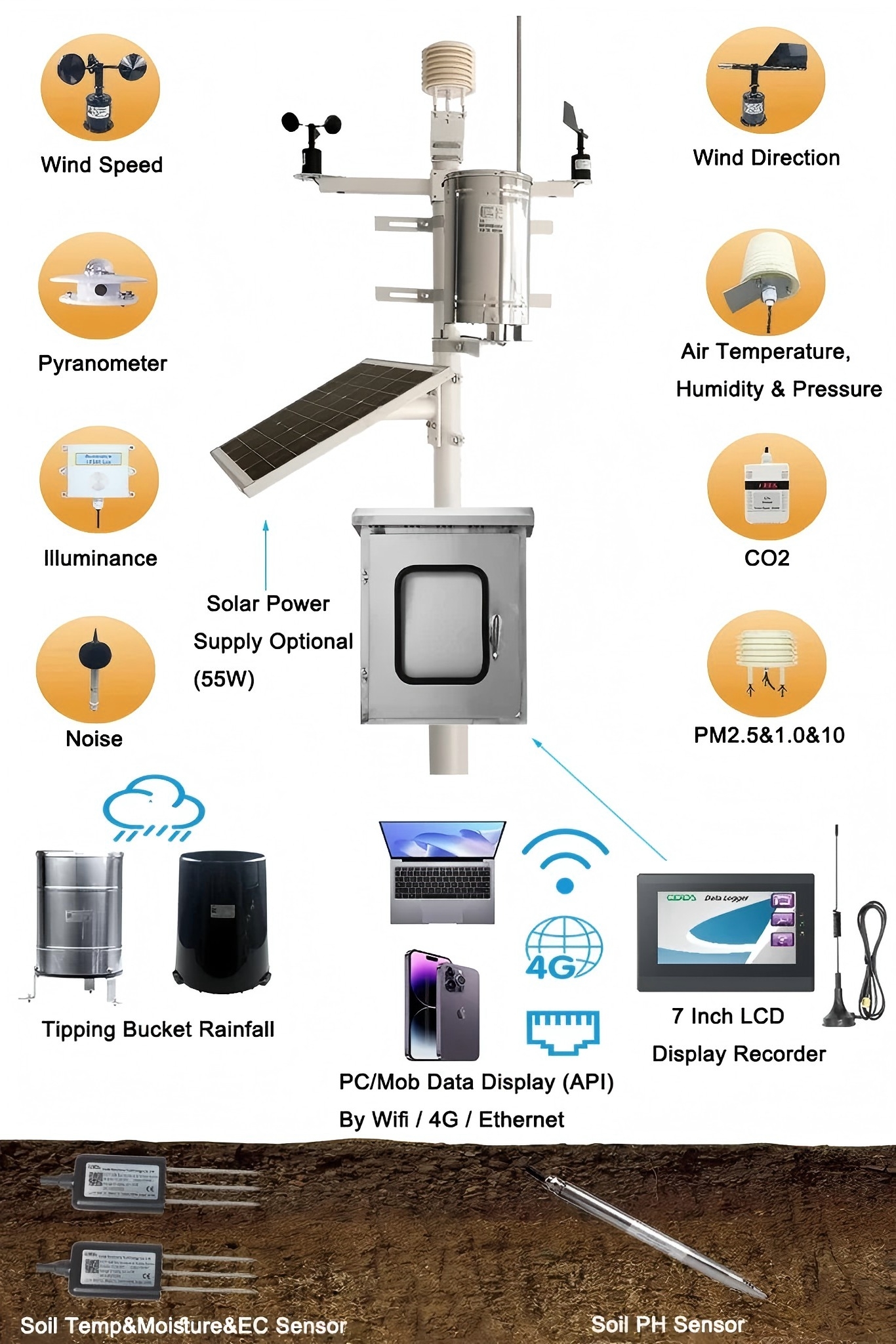An AWS weather station (Automatic Weather Station) represents a revolutionary leap in meteorological technology. These sophisticated systems automatically collect, process, and transmit weather data without requiring constant human intervention. Unlike traditional weather stations that need manual readings, an automatic weather station operates 24/7, providing real-time atmospheric measurements with exceptional accuracy.
Modern AWS units typically measure:
Temperature and humidity levels
Wind speed and direction
Rainfall amounts and precipitation types
Solar radiation and UV levels
Atmospheric pressure trends
Automatic weather stations provide continuous monitoring, capturing weather patterns that manual stations might miss. This includes:
Sudden microclimate changes
Overnight temperature fluctuations
Instantaneous wind gusts during storms
Advanced sensors in AWS weather station systems eliminate human reading errors through:
Precision-calibrated instruments
High-frequency sampling (often every minute)
Automated quality control algorithms
Modern systems offer:
Real-time data transmission via cellular or satellite
Cloud-based data storage and visualization
Mobile alerts for extreme weather conditions
While initial investment may be higher, automatic weather stations reduce long-term costs by:
Minimizing personnel requirements
Lowering maintenance needs
Preventing data loss through automated backups
A complete AWS weather station system comprises several critical elements:
Atmospheric sensors: For temperature, humidity, pressure
Precipitation gauges: Tipping bucket or weighing-type
Wind monitors: Ultrasonic or cup anemometers
Solar instruments: Pyranometers, UV sensors
The brain of the automatic weather station that:
Collects sensor measurements
Performs initial data processing
Stores information during transmission gaps
Options include:
Cellular modems (3G/4G/LTE)
Satellite transmitters
Radio frequency networks
WiFi connections
Most stations use:
Solar panels with battery backup
AC power where available
Low-power designs for remote locations
AWS weather stations help farmers with:
Irrigation scheduling
Frost warnings
Disease risk modeling
Growth stage monitoring
Airports rely on automatic weather stations for:
Runway condition reports
Wind shear detection
Visibility monitoring
De-icing operations
Wind and solar farms use AWS data for:
Power output forecasting
Turbine performance optimization
Solar array positioning
Cities deploy networks of AWS weather stations to:
Monitor urban heat islands
Track pollution dispersion
Manage stormwater systems
Plan climate-resilient infrastructure
When choosing an automatic weather station, evaluate:
Measurement parameters needed for your application
Data accuracy requirements
Communication needs (real-time vs. periodic)
Power availability at the site
Environmental conditions (extreme weather tolerance)
For optimal performance:
Follow manufacturer siting guidelines
Ensure proper sensor height and exposure
Implement lightning protection
Schedule regular maintenance checks
Verify data quality periodically

Emerging technologies are transforming AWS weather station capabilities:
AI-powered analytics for better forecasting
Miniaturized sensors for dense networks
IoT integration with other environmental monitors
Blockchain-secured data logging
Self-diagnosing systems for predictive maintenance
Automatic weather stations have become indispensable tools across numerous sectors by providing:
More reliable weather data
Earlier extreme weather warnings
Better-informed operational decisions
Enhanced climate change research
Whether you're a farmer needing frost alerts, an airport requiring precise wind data, or a city planning climate resilience, investing in a quality AWS weather station delivers measurable returns through superior environmental intelligence.
In the era of precision agriculture, the efficie
Discover how online pH sensors improve smart agr
Choosing the right online pH sensor is critical
Contact: Molly
Phone: +86-17775769236
Tel: 86-0731-85117089
Email: molly@codasensor.com
Add: Building S5, Aux Square, Yuelu District, Changsha City, Hunan Province, China
We chat